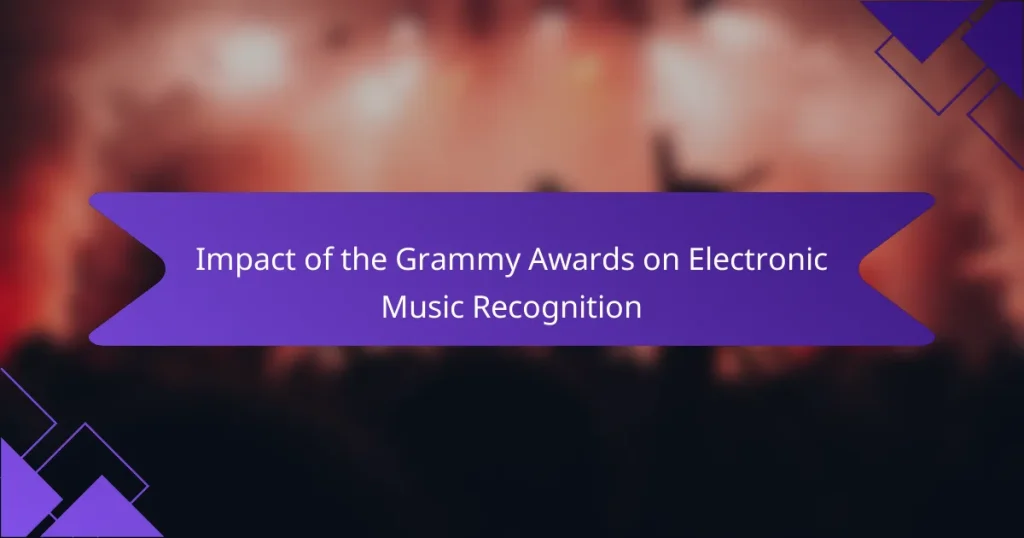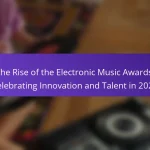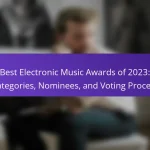The Grammy Awards significantly impact the recognition of electronic music, enhancing the visibility and credibility of artists within this genre. The introduction of specific categories, such as Best Dance Recording and Best Dance/Electronic Album, validates electronic music in the broader music industry. Winning or being nominated for a Grammy can lead to increased commercial success and inspire new artists to pursue careers in electronic music. Historically, influential artists like Daft Punk and Skrillex have shaped industry trends through their Grammy recognition. This article explores the implications of Grammy Awards on electronic music, including strategies for artists to enhance their chances of recognition.
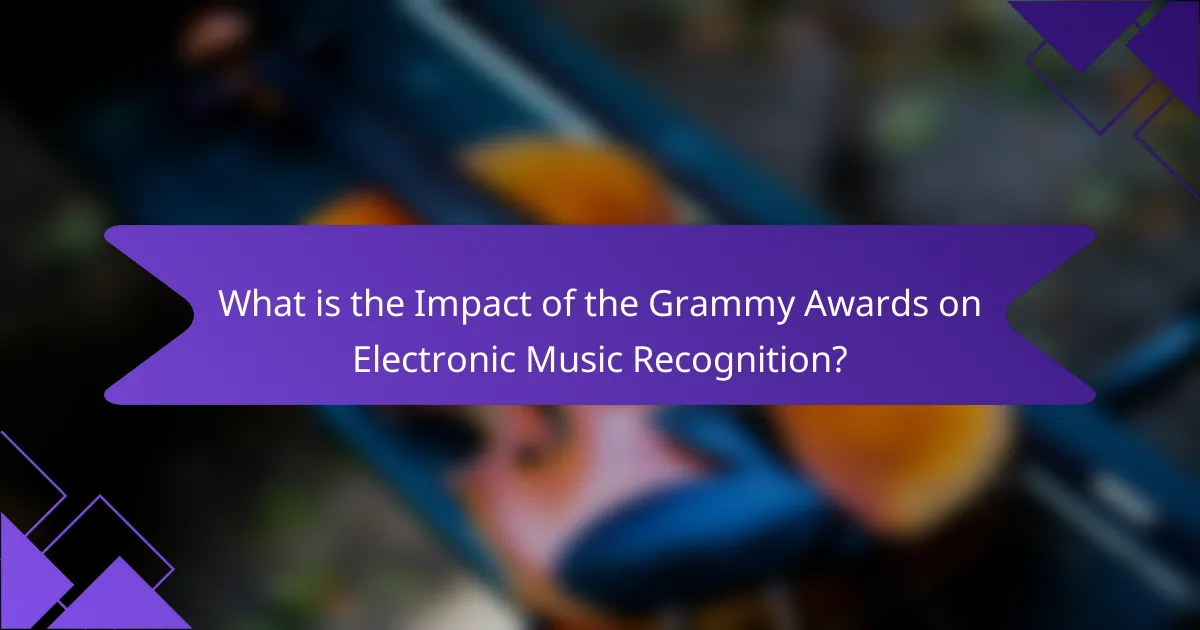
What is the Impact of the Grammy Awards on Electronic Music Recognition?
The Grammy Awards significantly enhance the recognition of electronic music. Winning or being nominated for a Grammy can elevate an artist’s profile. This increased visibility often leads to greater commercial success. The Grammy Awards have introduced specific categories for electronic music, such as Best Dance Recording. This inclusion validates the genre within the broader music industry. The recognition can inspire new artists to pursue electronic music. Historical Grammy winners in this category include Daft Punk and Skrillex. Their success has influenced industry trends and audience perceptions. Overall, the Grammy Awards play a crucial role in legitimizing electronic music.
How have the Grammy Awards evolved in relation to electronic music?
The Grammy Awards have increasingly recognized electronic music over the years. Initially, electronic music was largely overlooked by the Grammys. In 1998, the first Grammy for Best Dance Recording was awarded, acknowledging the genre’s presence. This marked a significant shift in the awards’ approach to electronic music. Over time, more categories have been introduced, such as Best Dance/Electronic Album. The inclusion of prominent electronic artists in nominations and performances has also grown. Artists like Daft Punk and Calvin Harris have received multiple nominations and wins. This evolution reflects the genre’s rising influence in the music industry. The Grammy Awards now play a crucial role in legitimizing electronic music as a mainstream genre.
What categories exist for electronic music at the Grammy Awards?
The Grammy Awards feature several categories for electronic music. These include Best Dance/Electronic Album, Best Dance Recording, and Best Remixed Recording, Non-Classical. Best Dance/Electronic Album recognizes outstanding albums in the electronic genre. Best Dance Recording honors individual tracks that excel in dance music. Best Remixed Recording, Non-Classical celebrates exceptional remixes of existing songs. These categories highlight the significance of electronic music within the broader music industry.
How has the representation of electronic music changed over the years?
The representation of electronic music has evolved significantly over the years. Initially, electronic music was marginalized and often considered niche. In the 1980s and 1990s, it gained some recognition through underground clubs and rave culture. The rise of genres like techno and house brought electronic music to a broader audience. By the 2000s, mainstream artists began incorporating electronic elements into pop music. The Grammy Awards began recognizing electronic music more prominently, with categories specifically for electronic dance music introduced in 2012. This recognition has helped legitimize electronic music within the broader music industry. Today, electronic music artists frequently headline major festivals and receive nominations for prestigious awards.
Why are the Grammy Awards significant for electronic music artists?
The Grammy Awards are significant for electronic music artists because they provide mainstream recognition and validation. Winning or being nominated for a Grammy can elevate an artist’s profile in the industry. This recognition often leads to increased sales and streaming of their music. Additionally, the awards highlight electronic music’s influence on contemporary music genres. They also foster greater acceptance of electronic music within the broader music community. Historically, electronic music categories at the Grammys have gained prominence since the 1990s. This shift indicates a growing appreciation for the genre among industry professionals. Overall, the Grammy Awards serve as a benchmark for success in the music industry, impacting an artist’s career trajectory.
What benefits do nominations and wins provide to electronic music artists?
Nominations and wins provide significant recognition and credibility to electronic music artists. This recognition can lead to increased visibility within the industry. A Grammy nomination can elevate an artist’s profile, attracting new fans and followers. Winning a Grammy often results in heightened media exposure and promotional opportunities.
Additionally, these accolades can enhance an artist’s marketability, making them more appealing to labels and sponsors. Financial benefits may also arise, as Grammy winners often see a boost in album sales and streaming numbers. According to a study by the Recording Academy, Grammy winners experience an average sales increase of 100% within weeks of the award.
Overall, nominations and wins serve as a powerful endorsement, validating the artist’s work and opening doors to new opportunities.
How do Grammy recognitions influence an artist’s career trajectory?
Grammy recognitions significantly enhance an artist’s career trajectory. Winning or being nominated for a Grammy increases visibility in the music industry. This recognition often leads to higher sales and streaming numbers. Artists frequently experience a boost in concert attendance following a Grammy win. Collaborations with other high-profile artists become more common after receiving a Grammy. Additionally, Grammy winners often secure better deals with record labels. The prestige of the award can lead to greater media exposure and interview opportunities. Historical data shows that Grammy winners see a notable increase in their marketability and brand partnerships.
What challenges do electronic music artists face in gaining recognition at the Grammys?
Electronic music artists face significant challenges in gaining recognition at the Grammys. One major challenge is genre bias, as the Grammy Awards have historically favored traditional music genres. This bias can overshadow the contributions of electronic artists. Additionally, the lack of representation in key voting bodies can limit their visibility. Many Grammy voters may not fully understand electronic music’s nuances. This results in fewer nominations and awards for electronic artists. Furthermore, electronic music often relies on collaboration, making it harder to identify a singular artist for recognition. The evolving nature of the genre can also complicate its categorization within the Grammy framework. Overall, these factors contribute to the ongoing struggle for electronic music artists to achieve Grammy recognition.
What biases exist within the Grammy voting process regarding electronic music?
The Grammy voting process exhibits biases against electronic music. This stems from a lack of understanding among voters who may favor traditional genres. Many voters are influenced by personal preferences, which can overshadow objective evaluations. Historical trends show that electronic music often receives fewer nominations compared to rock or pop genres. Additionally, the categorization of electronic music can be inconsistent, leading to underrepresentation. The Grammy Awards have been criticized for not fully embracing the diversity of electronic music. This bias can affect the visibility and recognition of electronic artists within the industry.
How does the perception of electronic music differ among Grammy voters?
The perception of electronic music among Grammy voters varies significantly. Some Grammy voters view electronic music as innovative and deserving of recognition. They appreciate its influence on contemporary music trends. Other voters may regard electronic music as less authentic or lacking traditional musicality. This perspective can lead to skepticism about its artistic merit. Historical Grammy nominations show a gradual acceptance of electronic genres. For example, the inclusion of categories like Best Dance/Electronic Album reflects this shift. However, mainstream recognition still lags behind other genres. This disparity highlights ongoing debates within the voting body regarding the value of electronic music.
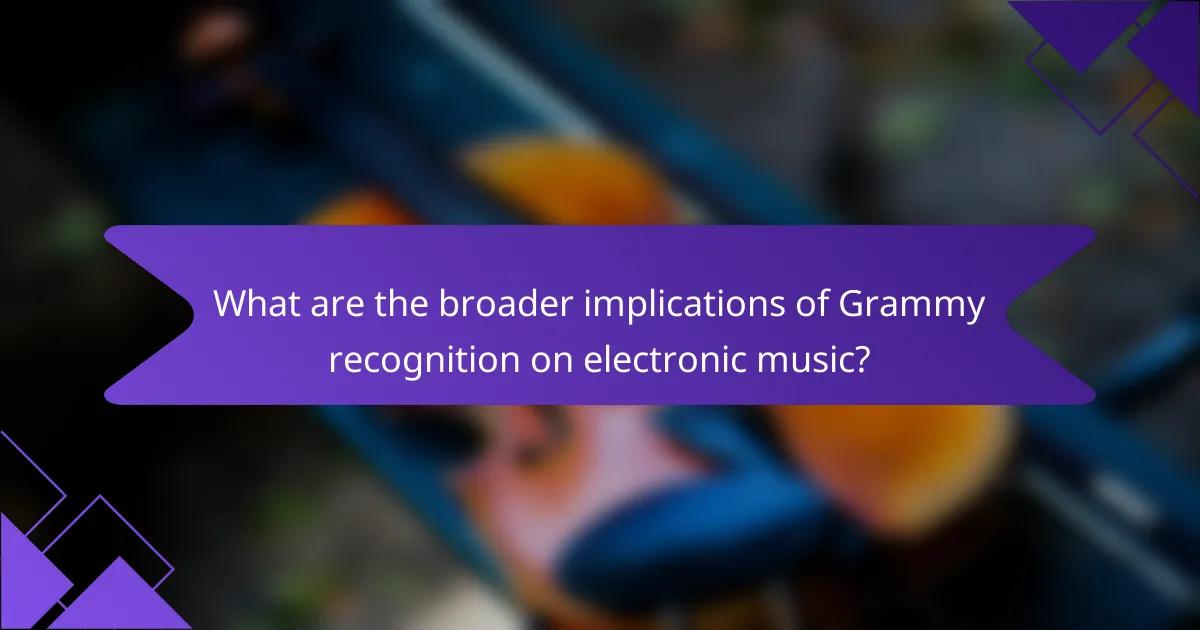
What are the broader implications of Grammy recognition on electronic music?
Grammy recognition significantly elevates the status of electronic music within the broader music industry. This recognition validates the genre and its artists, leading to increased visibility and credibility. It often results in greater media coverage and promotional opportunities for electronic musicians. Additionally, Grammy wins can influence mainstream acceptance, encouraging more collaborations between electronic artists and traditional musicians. The awards can also drive increased sales and streaming numbers for nominated and winning tracks. Historically, electronic music has gained traction in the Grammy categories, reflecting its growing influence. For instance, the introduction of the Best Dance/Electronic Album category in 2005 highlighted this shift. Overall, Grammy recognition fosters a more inclusive music landscape that embraces diverse genres.
How does Grammy recognition affect the electronic music industry as a whole?
Grammy recognition significantly elevates the visibility of the electronic music industry. It provides artists with a prestigious platform, enhancing their credibility. Winning or being nominated can lead to increased sales and streaming of their music. This recognition often attracts new listeners who may not have been familiar with the genre. Additionally, it encourages record labels to invest more in electronic music projects. The Grammy Awards have historically included categories for electronic music, validating its artistic merit. This validation can inspire emerging artists to pursue careers in the electronic music scene. Overall, Grammy recognition helps to legitimize electronic music within the broader music industry.
What trends in electronic music have emerged following Grammy wins?
Following Grammy wins, several trends in electronic music have emerged. Increased mainstream visibility is notable. Artists like Daft Punk and Calvin Harris gained wider audiences after their Grammy successes. Collaborations between electronic artists and mainstream pop musicians have become more frequent. This trend expands the genre’s reach and appeal. Additionally, there has been a rise in electronic music festivals and events. These events often showcase Grammy-winning artists, attracting larger crowds. Streaming platforms have also seen a surge in electronic music playlists. This shift reflects changing consumer preferences influenced by Grammy recognition. Overall, Grammy wins have catalyzed significant growth and diversification within the electronic music landscape.
How does Grammy recognition influence electronic music festivals and events?
Grammy recognition enhances the visibility and credibility of electronic music festivals and events. When artists receive Grammy nominations or awards, it elevates their status in the industry. This recognition often leads to increased ticket sales and attendance at festivals featuring these artists. Additionally, festivals may attract more sponsorships and partnerships due to the association with Grammy-recognized talent. For example, the Grammy Awards have highlighted electronic categories in recent years, which has encouraged festival organizers to showcase these genres more prominently. Consequently, the overall quality and production value of electronic music events tend to improve as they compete for recognition. This cycle reinforces the growth of the electronic music scene, making it more appealing to mainstream audiences.
What role does media coverage play in the recognition of electronic music at the Grammys?
Media coverage significantly influences the recognition of electronic music at the Grammys. It shapes public perception and highlights electronic music artists and their contributions. Extensive media attention can elevate an artist’s profile, leading to increased nominations and wins. For example, the rise of artists like Skrillex was fueled by media coverage, which helped mainstream acceptance of electronic music. Furthermore, media narratives can create buzz around specific genres or subgenres, impacting the Grammy voting process. In recent years, categories for electronic music have expanded, partly due to increased media focus. This coverage not only informs voters but also engages fans, creating a larger audience for electronic music. Ultimately, media coverage acts as a catalyst for the recognition and celebration of electronic music within the Grammy framework.
How does media portrayal affect public perception of electronic music?
Media portrayal significantly influences public perception of electronic music. Positive media coverage can enhance the genre’s credibility and popularity. For instance, prominent features in mainstream outlets can introduce electronic music to wider audiences. This exposure often leads to increased attendance at electronic music events and festivals. Conversely, negative portrayals can perpetuate stereotypes and diminish the genre’s reputation. Research indicates that media representation shapes audience attitudes and behaviors. A study by the Journal of Popular Music Studies highlights that favorable media narratives correlate with higher listener engagement. Thus, media portrayal plays a crucial role in shaping how electronic music is perceived by the public.
What impact does social media have on Grammy nominations for electronic artists?
Social media significantly influences Grammy nominations for electronic artists. It serves as a platform for artists to engage with fans and build a following. Increased visibility on social media can lead to higher streaming numbers and sales. These metrics are often considered by Grammy voters. Additionally, social media buzz can create a narrative around an artist’s work. This narrative can sway public opinion and voter perception. For instance, viral trends or challenges can elevate an artist’s profile. Overall, social media acts as a catalyst for recognition and nomination potential in the Grammy Awards.
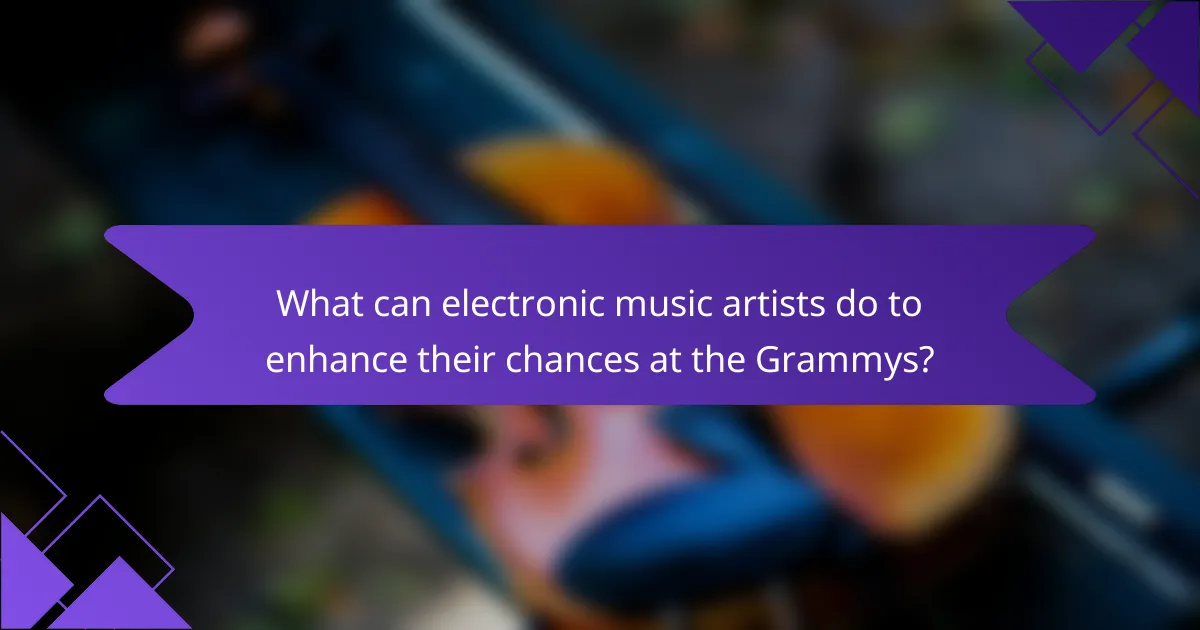
What can electronic music artists do to enhance their chances at the Grammys?
Electronic music artists can enhance their chances at the Grammys by focusing on quality production and innovation. They should collaborate with established artists to increase visibility. Engaging in live performances can also boost their profile. Submitting work in the correct categories is essential for recognition. Building a strong online presence helps in audience engagement. Networking within the industry can lead to valuable connections. Staying updated on Grammy voting processes is crucial for strategic submissions. Historically, artists who follow these strategies have seen increased nominations and wins.
What strategies can artists employ to gain visibility for Grammy consideration?
Artists can employ several strategies to gain visibility for Grammy consideration. Building a strong online presence is essential. Engaging actively on social media platforms can help reach wider audiences. Collaborating with established artists can also enhance visibility. Performing at high-profile events increases exposure. Submitting music to industry publications for reviews can attract attention. Networking within the music industry is crucial for gaining support. Creating high-quality music videos can visually captivate potential voters. Finally, maintaining a consistent release schedule keeps artists relevant in the industry. These strategies collectively enhance an artist’s chances for Grammy recognition.
How important is collaboration with other genres for Grammy success?
Collaboration with other genres is crucial for Grammy success. Genre-blending often attracts a wider audience and increases visibility. For instance, collaborations can create unique sounds that stand out. Historical data shows that cross-genre collaborations have won numerous Grammy Awards. Artists like Lil Nas X and Billie Eilish exemplify this trend. Their success highlights the value of genre diversity in music. Additionally, Grammy voters often favor innovative and diverse musical expressions. This trend suggests that collaboration enhances an artist’s chances of recognition at the Grammys.
What role does networking within the industry play in securing nominations?
Networking within the industry plays a crucial role in securing nominations. Strong connections can lead to increased visibility among decision-makers. Industry professionals often recommend artists to nomination committees. Personal relationships can influence perceptions of an artist’s work. Collaborations with established artists enhance credibility and exposure. Networking also provides access to exclusive events and showcases. These opportunities allow artists to present their music directly to influential figures. Ultimately, effective networking can significantly improve an artist’s chances for Grammy nominations.
What are the best practices for submitting work for Grammy consideration?
The best practices for submitting work for Grammy consideration include ensuring eligibility, following submission guidelines, and promoting the work effectively. Eligibility requires that the work be released during the specified eligibility period. Submission guidelines are outlined by the Recording Academy and must be adhered to closely. Artists should provide high-quality recordings and clear metadata. Effective promotion involves leveraging social media and industry connections to generate buzz. Engaging with Grammy members can also enhance visibility. These practices increase the chances of being considered for a nomination.
What guidelines should artists follow when submitting their music?
Artists should follow specific guidelines when submitting their music. First, they must ensure their music is professionally produced and mixed. High-quality audio is essential for consideration by industry professionals. Second, artists should include a well-crafted cover letter. This letter should outline their artistic vision and provide context for the submission. Third, they need to adhere to submission deadlines. Missing deadlines can result in disqualification from opportunities. Fourth, artists should provide all required materials. This includes bios, photos, and links to their work. Finally, they should research submission platforms thoroughly. Understanding each platform’s requirements increases the chances of a successful submission. These guidelines are crucial for artists aiming to gain recognition in competitive environments like the Grammy Awards.
How can artists effectively promote their submissions to voters?
Artists can effectively promote their submissions to voters by utilizing social media platforms. They should create engaging content that highlights their work. Sharing behind-the-scenes footage can attract interest. Collaborating with influencers can expand their reach. Hosting virtual events or live streams can engage potential voters directly. Email newsletters can keep fans informed about their submissions. Additionally, artists can encourage fans to share their work within their networks. Statistics show that social media engagement can significantly increase visibility for artists’ submissions.
The main entity of this article is the Grammy Awards and their impact on electronic music recognition. The article explores how Grammy nominations and wins enhance the visibility and credibility of electronic music artists, leading to increased commercial success and mainstream acceptance of the genre. It discusses the evolution of Grammy categories specifically for electronic music, the challenges artists face in gaining recognition, and the broader implications of Grammy recognition on the electronic music industry. Additionally, the article outlines strategies for artists to enhance their chances at the Grammys, including collaboration, networking, and effective submission practices.
